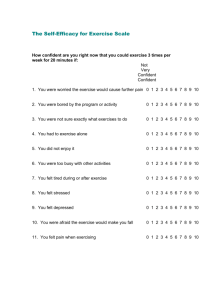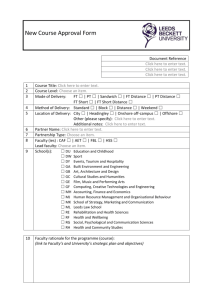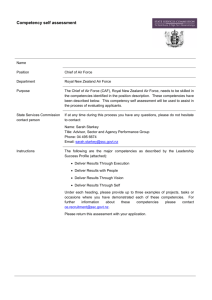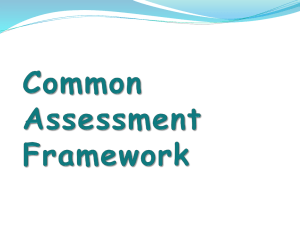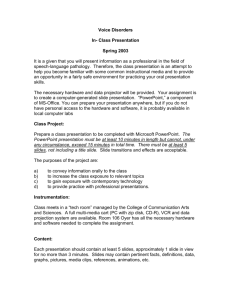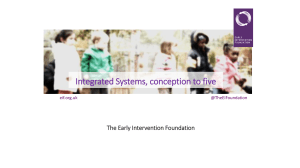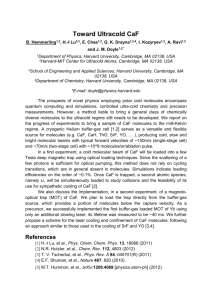Report on the Common Assessment Framework
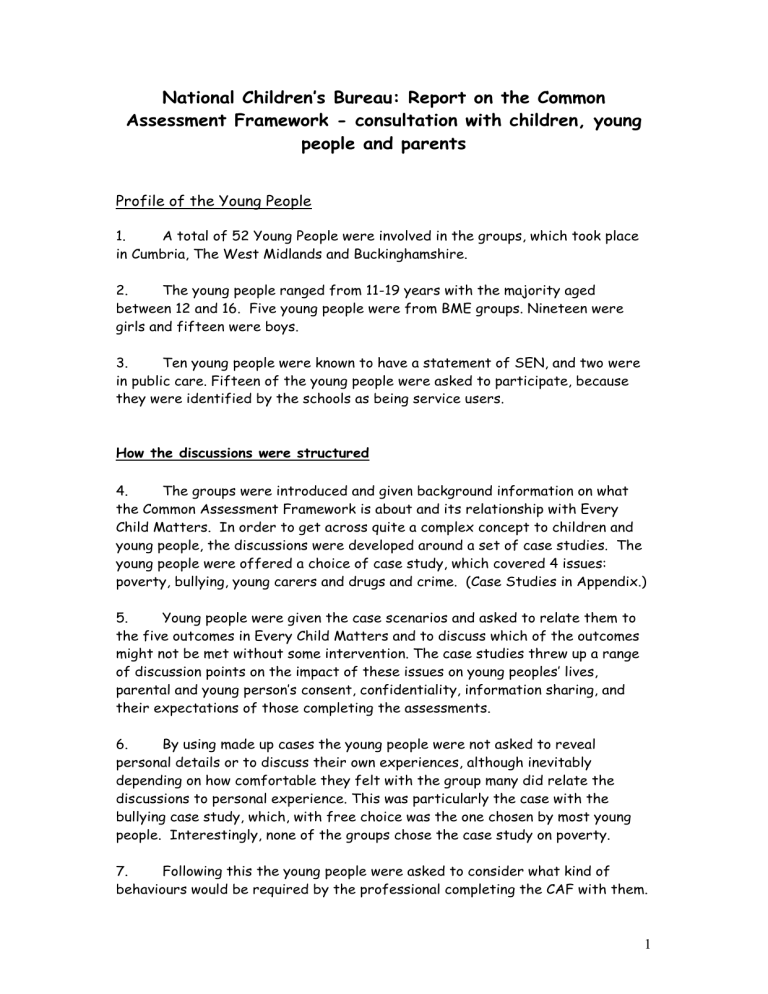
National Children’s Bureau: Report on the Common
Assessment Framework - consultation with children, young people and parents
Profile of the Young People
1.
A total of 52 Young People were involved in the groups, which took place in Cumbria, The West Midlands and Buckinghamshire.
2.
The young people ranged from 11-19 years with the majority aged between 12 and 16. Five young people were from BME groups. Nineteen were girls and fifteen were boys.
3.
Ten young people were known to have a statement of SEN, and two were in public care. Fifteen of the young people were asked to participate, because they were identified by the schools as being service users.
How the discussions were structured
4.
The groups were introduced and given background information on what the Common Assessment Framework is about and its relationship with Every
Child Matters. In order to get across quite a complex concept to children and young people, the discussions were developed around a set of case studies. The young people were offered a choice of case study, which covered 4 issues: poverty, bullying, young carers and drugs and crime. (Case Studies in Appendix.)
5.
Young people were given the case scenarios and asked to relate them to the five outcomes in Every Child Matters and to discuss which of the outcomes might not be met without some intervention. The case studies threw up a range of discussion points on the impact of these issues on young peoples’ lives, parental and young person’s consent, confidentiality, information sharing, and their expectations of those completing the assessments.
6.
By using made up cases the young people were not asked to reveal personal details or to discuss their own experiences, although inevitably depending on how comfortable they felt with the group many did relate the discussions to personal experience. This was particularly the case with the bullying case study, which, with free choice was the one chosen by most young people. Interestingly, none of the groups chose the case study on poverty.
7.
Following this the young people were asked to consider what kind of behaviours would be required by the professional completing the CAF with them.
1
These were observations not about the content of the CAF but about the process of engagement and user involvement.
8.
The group at the Special School required a different approach because of their particular needs. This session was conducted slightly differently with the support of a staff member, who knew them well and was able to facilitate communication following a pre meeting to discuss the CAF and the issues we wanted young people’s views on.
The Parents
9.
The parents group although small, (5), were very happy to talk from personal experience and shared a great deal of sensitive information. This session was not structured and we allowed the parents to talk freely. All had completed a “Strengthening Families” parenting course and so know each other well and had all had recent contact with service providers in respect of their children. These ranged from children’s disability services, Education Welfare
Service, Social Services and Schools (teachers).
10.
The parents group were very articulate and spoke from personal experience throughout most of the discussion. Four of the five parents were from BME groups; all were or had been service users.
General Views on the Common Assessment Framework
11.
Young people generally thought it was a good idea, especially early intervention. They thought there should be more information given young people about what services are out there, not just leaflets but people coming into schools. Some also thought there should be at least one person based in every school that could support them.
12.
Parents were also generally supportive of the idea behind the CAF, though more cynical and sceptical about the pace of change:
“There's a lot of talk, a lot of discussion but years go by and nothing changes, what will make this one any different?”
“Hasn’t that been what the government have been trying to do for years anyway?”
“As parent we often have so much going on we do need that support.
We can’t always explain ourselves because of the pressures of life; this could be a support to us.”
2
“The idea is good, it’s definitely a good idea. Realistically you need leaders, people that are up front, word of mouth is good. Not leafleting all over the place, but a few key people. It works that way out. This thing could work if enough people are consistent if enough people, leaders, push it.” (Parents)
“There should be an advert campaign about this and how it will affect young people then it will be easier to get involved” (Young Person)
Young People On Confidentiality
13.
This was a very important issue for young people. Older young people in particular felt that unless they could be guaranteed confidentiality they would lie! (I think by this they meant they would withhold information) particularly if they had issues about drugs, criminal activity or something that they felt may prejudice them. They also felt that without guarantees of confidentiality some would be discouraged from seeking help when they needed it.
“Confidentiality and trust, they go together really”
14.
A minority of young people felt that the right to confidentiality should never be overridden, others appreciated that it was never that simple and believed that there may be some circumstances when information sharing was necessary. The example they gave were where the young person themselves, or others were at serious risk, or if a serious crime had been committed. However, whilst they appreciated that there had to be “small print” they felt strongly that they should be absolutely clear from the start what was in the small print.
15.
Young people also commented on issues about confidentiality between parents and themselves and recognised that although it would be best if your parents knew what was going on, there may be some circumstances where a person’s right to confidentiality should be maintained even if it meant withholding information from parents. There was general agreement between all groups that support with telling parents difficult information would be useful.
When asked if age should be a factor in whether or not parents should be involved, there was agreement that this should be the case but no real consensus on what that age might be. Older young people appreciated the difference between chronological age and maturity and agreed that the two did not necessarily go hand in hand.
3
Young People On Information Sharing and Consent
16.
Most young people saw the need to share information but were able to see the complexity involved. This differed with the young people with special educational needs as they had a more dependent relationship with their parents and carers and the professionals they came into contact with. They tended to view their parents and their school as very central to their lives, which is understandable as their opportunities outside of school were limited by the lack of inclusive provision in their area, and the lack of opportunities to access mainstream activities.
17.
Young people also felt that not everyone involved with them needed to know everything and wanted to have some right of veto over certain information being passed on and to be able to “refuse” to give information on specific elements of the CAF.
18.
Young people attached many provisos to information sharing and felt that it would vary according to the nature of the problem and the age/maturity of the young person. They recognised the need to pass information on if there was a serious risk to the young person.
19.
Older young people felt that there should be a clear and unequivocal statement about information sharing for them to read before they divulged information and that this should take into account the nature of the problem, the role of the family in the young person’s life, and the pro’s & cons of involving family members.
20.
Police officers were identified by all groups as the service they would not want information to be shared with. This issue was explored further with a group of older young people and they felt that the Police never really go “off the record”.
21.
The issue of consent varied slightly depending on the age group. Younger participants and those with special needs were much more keen for their parents, usually mothers to be involved and to be informed about the young person’s problem. However, older young people felt that they should have been able to give or deny consent to a CAF in their own right. They also felt that it may sometimes be appropriate for parents not to be told certain information but when prompted further they did agree that ideally parents should be informed, and that it would be good if professionals could help with the process of telling parents things which they may find difficult but they recognised that some parents are just not that helpful.
4
Parents on Information Sharing and Consent
22.
Parents were far more cynical and believed that their refusal to consent to a common assessment would have repercussions:
“It sounds nice but I can’t see that working”
“Parents might find it intrusive or feel that they are doing something wrong. What you are saying is a good idea, the idea is good. It’s about getting past this where if people ask for help they are stigmatised or labelled, that is the barrier and it’s hard to break down.”
“It might be that if someone (a professional) said to me they have some concerns about my child, I might not agree or I might think I can deal with it, so if I then say no and they walk away, in my head I will be thinking what are they going to walk away and do? If I’ve said no to an assessment I just know you are going to walk away and do something. I don’t know what. Is it real consent really? If you say no to some official is that a straightforward no, are they going to shut the case? Or is it that we are going to put it on the side and go back and check?”
“Every time you are asked a question you are being judged.”
23.
Parents were not wholly supportive of the idea of a young person giving consent in their own right. They did recognise that for some older young people this may be different. They appreciated the complexity of it but felt that on balance parents should be told what is going on with their child. They too recognised that for some parents may not be as helpful and supportive as they should be.
“It depends on the parents’ relationship with the child. Not all parents will even want to know but I think they should be made to face up to what’s going on”
“It’s not a good idea to keep things from parents, that causes a lot more problems in the long run”
“If it’s something really serious I think that worker should break confidentiality to the child and tell the parents. Where that threshold is would vary from person to person”
5
Young People and Parents On User Involvement
24.
A number of young people felt that they should be able to complete part of the CAF themselves. It was also suggested that where appropriate their parents could initiate or complete a CAF, as they probably knew them best.
Older young people felt that user involvement and commitment to wanting support was quite central to the success of any plans. This was particularly in relation to the case study on drugs and crime.
“There’s got to be commitment otherwise there’s no point at all”
It has to be ultimately down to him (case study subject).”
25.
Parents were very keen on the idea of having greater involvement but were not convinced that things would change. They had all experienced services which had been “done to them” and left them feeling angry and upset.
“I just felt like I was being told off”
“I was struggling, I needed some help and all I got was sort it out or
I’m going to get you fined”
26.
Not all experiences of services were negative and parents were quick to point out just how difficult and stressful it can be for workers (social workers and teachers). They also had great praise for those who had supported them.
“It’s not that he’s chosen to be nice, he is nice, he talks to my missus she feels that same, we collaborate together. He’s not going to walk out the door and say that’s their tough luck, I’m going home it’s 5 o’clock.”
“It’s not about telling parents what to do, it’s about guiding them and being there if you need help”
27.
What Young People Expect of Professionals Completing the CAF.
28.
Views on professional ‘behaviour’ were sought using two different but linked exercises. First the groups were asked to come up with “The Worlds
Worst Assessor”. The following statements are young peoples idea of the worst assessor:
Too official
Patronising
6
Intimidating
Laughing at you and the problem
Derogatory remarks
Drones on
Tells you what to do instead of advising
Having no opinion doesn’t always help - need a balance between advice and telling you to do something. Sits on the wall too much
No manners
Keeps talking over you
Thinks they are better than you
Lack of attention
No consideration for you
My way or the highway attitude
Brands all children and young people with the same brush
Treats you like you are stupid
No intention of helping you – going through the motions
No heart in their job – just a salary
Do what you don’t want them to do
Blackmail you
No consideration of the personality of the YP
Not like you at all
Gossip about you. Worst thing you can do
Often turns up late and answers their phone while talking to you
Doesn’t give you the attention you need
Refers to others problems in order to resolve yours… not helpful
29.
All groups found this quite difficult and tended to look for positive attributes. The groups were then asked to rank professional attributes and behaviour in order of importance. They consistently rated trust and confidentiality very highly when asked to rank statements about the qualities of professionals working with them.
30.
In one session, the ranking exercise was done in two groups: One male one female. The boys rated the fact that there was going to be something at the end of it, i.e. resources, support and help, they saw the whole exercise as totally pointless without this. The girls rated trust highest. When we talked about the differences, the girls felt that very often just the chance to talk through a problem with someone you trust was as valuable if not more so than having
“tangible help”. The boys felt that just talking was a pointless exercise without an outcome. In another group, which was mixed but included quite an outspoken young man they too rated the help being available at the end of it as the second most important factor.
7
31.
We talked about the need for professionals to be properly trained and qualified and the young people generally felt that whilst they should know what they (professionals) are talking about that this in itself was not a key factor.
They also felt that it was appropriate for professionals to be “tough at the right time.”
“A title is nothing, it’s what’s in the heart”
“ But what about our parents, they know us really well and they are not professional”
32.
Young people were more concerned about personal qualities. Qualities that came up repeatedly included:
Trustworthiness
Being kind and caring
Being non-judgemental
Genuine and personal interest
Not being too official
Not being patronising
Sympathetic but also able to be supportive
Having respect
33.
Young people did not generally feel that having a professional of the same ethnic group, or the same gender was important but they did have some exceptions. They said that in some cases a person might feel more comfortable talking to someone of the same gender, e.g. around health issues.
34.
There were also differing views on whether or not the CAF would be best completed by someone known to the young person and their family. Many felt that somebody who was known to them would be best, but again there were exceptions and some felt strongly that it can be easier to talk to someone you don’t know, or who has no historical knowledge of you, as they would not be making judgments about things that happened years ago.
35.
What Parents Expect from Professionals Completing the CAF
36.
Parents’ views were not dissimilar although they felt it would be good to have more professionals from their communities (ethnicity was not the issue here), more people who had similar backgrounds and experiences as them, and could relate to what they were going through. They wanted to be treated with respect and to be treated as adults. The following views were expressed.
8
“The person I would trust is someone who has been where I have been.”
“Someone who can give of themselves as well.”
“It’s about your life experiences but with out giving too much away about you personal life”.
“If they give their experiences without being too personal, I then want to open up to the person.”
37.
Parents, as with young people were more concerned about interpersonal skills than qualifications.
“I can take bad news in a nice way but it’s the way you put it over.
It’s personal skills, if you spent more time on that then there would be more Christmas cards.”
“If you are judged by what’s on a piece of paper or a clipboard and you’re asking systematic questions, that’s going to have your back up straight away. I would say in social services you’ve got a few good people in there, really good people, I have to say that, who have a good way about them and their approach to people. There are others who have not got a clue how to talk to someone. (Others in the group agreed). How to present themselves and how to make someone feel relaxed, that’s where the problem lies.”
Summary
38.
In general all were supportive of the idea of the CAF. Their reservations were more about the process and the behaviours of professionals than the actual framework.
39.
It is clear from the diversity of views that young people feel there is no formula for doing this. They were very clear that being treated all the same was not what they wanted, rather they needed to be recognised as individuals and they wanted professionals to have the flexibility to accommodate them.
“This is for a model person. What if you are different?”
40.
Young people were concerned about the need to somehow have an element of control over the process, its pace, the outcomes and who would be told, and they felt they needed to be really clear about this before embarking on any kind of assessment process.
9
41.
The issues of consent and confidentiality were complex and most of the young people and parents appreciated this but felt the need for clarity, doubtless professionals will also need this.
42.
Professionals need to have good interpersonal skills in order to engage in a trusting relationship with service users. Trust is a consistently important factor for young people and parents.
43.
Many parents may be reluctant to approach services or accept help if they believe they will be judged or stigmatised.
44.
In conclusion, it is clear that the young people and parents we spoke to were broadly supportive of the CAF and that there was general consensus on many of the issues, but on just about everything there were exceptions, indicating a need for a very flexible and user sensitive approach to undertaking a common assessment, with principles to be adhered to, rather than procedural rules which curtail professional judgement and creativity and do not appreciate the individuality of every child and young person.
Jacqui Newvell
National Children’s Bureau
Pupil Inclusion Unit
December 2004
10
National Children’s Bureau: Report on the Common
Assessment Framework - consultation with children, young people and parents:
Case Studies Appendix
Personal Details
Name: Nicole Brown
“The Problem”
Age: 15
Nicole has truanted from school a day a week for the last term. When she is in school she finds it hard to concentrate on her schoolwork and often has aggressive outbursts. She is looking tired and sometimes comes into school looking scruffy and her clothes unwashed and/or ironed. She is often late. Nicole has few friends in school, and those she used to hang around with say she no longer wants to spend time with them. The school have sent letters home but Mrs Brown has failed to contact the school.
Nicole’s Strengths
Nicole is an academically able student. She excels at English and has produced some excellent creative writing. Nicole used to be a regular attender and her problems have arisen in the last few months. She was predicted to gain GCSE passes at A & B in all key subjects but her teachers are concerned that this may not now be the case.
“The Family”
Nicole lives with her Mother and two younger brothers. Nicole’s father left the family last year and has moved away from the area. Nicole has an aunt living nearby. She used to be close to her Aunt (her dad’s sister) but since her father left their relationship has been difficult. Nicole used to be close to her father but she has not seen him for a few months. The school are aware of this information as Nicole confided in the Education Welfare Officer who spoke to her a few months ago about her attendance.
“What the school doesn’t know”
Nicole’s mother was recently involved in a road traffic accident which has left her in constant pain. She is also suffering with depression following the breakdown of her marriage. Mrs Brown has been reluctant to ask for help as she was herself brought up in care and is worried her children will be taken away. Nicole is virtually running the house single- handed and has promised her mother not to tell anyone at school about her situation.
11
Facilitators Prompts
Which of the 5 outcomes we looked at earlier is Nicole unlikely to meet if things don’t change?
What could be done to help Nicole?
Who do you think could support her?
Who needs to know about her circumstances?
In what ways would a CAF be helpful in this situation?
Should Nicole have a choice about whether or not a CAF is completed?
Should Nicole’s Mother have a choice?
What if Nicole would like some help but her mum refuses?
Who do you think would be the best person to complete the CAF?
How should Nicole and her Mother be involved?
12
Personal Details
Daniel Khan
“The Problem”
Age: 11
Daniel is small for his age and seems to spend most of his time in school alone. He often arrives late and regularly asks to go to the medical room during break and lunchtimes. He is frequently off school with minor illness and his parents always telephone the school. Daniel is struggling with schoolwork and often fails to complete homework. He is tearful and anxious when challenged by teachers. Daniels parents have been to the school and are very concerned about him.
Daniel often forgets to bring books and equipment to school and has “lost” a number of items of clothing and equipment including his GameBoy. Daniel is massively underachieving in all subjects; even his usually excellent artwork has suffered. His art teacher with whom he has a very good relationship is particularly concerned. Daniel never really settled at secondary school, he is one of the youngest on the class and has not formed any new friendships. He transferred from a school, outside the area so has no classmates from his primary school. Daniel has very poor literacy skills and is quite immature in many ways.
“Daniel’s Strengths”
Daniel is a talented artist and he is brilliant at computer games.
“The Family”
Daniel is the only child of doting parents. His parents are always anxious about him, to the point where he is rarely allowed out of the house without them except for school. This is because of serious and violent harassment that took place in the area where they used to live and was the reason they moved house. Both Daniel’s parents work, though his mother works part time and is always at home when he returns from school.
“What the school doesn’t know”
Daniel is being severely bullied by a group of boys and girls in the class.
Both white and Asian classmates bully him because of his size and his ethnicity. He has his dinner money taken more or less daily and his books and equipment destroyed. He hasn’t told his parents or teachers because he fears the bullying will get worse.
13
Facilitators Prompts
Which of the 5 outcomes we looked at earlier is he unlikely to meet if things don’t change?
What could be done to help Daniel?
Would a CAF be a good idea in these circumstances?
Who would be the best person to complete the CAF?
Who needs to have all the information?
Why might Daniel not want his parents to know?
Why might Daniel not want to consent to the CAF or to information about him being scared?
How much of a say should Daniel have in what happens next?
Who in the school might be able to help?
Does it always have to be other adults or “professionals” who help?
Although bullying is a very serious concern for Daniel, is that the only problem he has?
14
Personal Details
Paula Brodie Age: 13
“The Problem”
Paula is a bright student but lately she has been missing odd days from school and arriving late, claiming she has missed the bus. She often goes without lunch saying she has lost her dinner money. Her appearance has also deteriorated and she is often scruffy and wearing clothes that are unsuitable. She is teased in class and other children have reported that she smells. Paula is reluctant to change for PE and usually manages to bunk off the lesson or find a reason to go to the medical room. She is always being told off by teachers, for not wearing the right school uniform. Her schoolwork is suffering and Paula has lost weight steadily over the past year and looks pale and tired, she has not yet started her periods.
“Paula’s Strengths”
Paula is great with young children and wants to be a child care worker when she leaves school. She is very friendly and sociable and rarely says anything bad about anyone.
“The Family”
Paula comes from a large family she is the eldest of 7 children, ranging from age 13 to 2 years. Paula’s father died in an accident just before the last child of the family was born. Paula is close to her mum and her brothers and sisters.
“What the school doesn’t know”
Since Mr Brodie’s accident Mrs Brodie has struggled to make ends meet.
Mrs Brodie cannot read and write very well and has found herself in considerable debt. She has arrears on her rent, gas, and electricity. She owes small amounts to many local shopkeepers, not to mention the catalogue and a local loan company who are about to get serious. The family washing machine has broken and there is no money to replace it. Despite this she makes sure that all her children go to school each day so that they do not
“end up like her”. Mrs Brodie is a proud woman and has not asked for help, financial or otherwise. Although she thinks the children do not know how serious the situation is, Paula has opened and read some of her Mothers mail and she is worried that they will be evicted from their house. She can’t talk to her Mum about her concerns, as she will then have to admit she opened her mail.
15
Facilitators Prompts
Which of the 5 outcomes if Paula unlikely to achieve unless she gets some help?
Would a CAF be a good idea in this situation?
What could be done to help Paula?
Who /what other services could be involved?
Is there anything the school could or should do to help?
Why might Paula be reluctant to give consent?
Why might her mum not want to give consent?
Should Paula be able have an assessment and some help even if her
Mum doesn’t want it?
Who would need to have all the information?
Do you think there are other issues for Paula that should be investigated? (health concerns, malnutrition/anorexia, school nurse referral)
16
Personal Details
Jonathan Grant Age: 14
“The Problem”
Jonathan has always been a lively and challenging young man. He has been excluded twice during the past school year for verbally abusing staff.
Jonathan is tall and well built and looks older than his age. Recently his usual high spirits have turned quite nasty and there have been more incidents of aggressive outbursts, for which he is usually very sorry afterwards. His parents have been called into school for a meeting.
Jonathan refused to attend but his parents have told the school that he is staying out late and sometimes not returning home until after midnight. He is secretive and becomes aggressive whenever they ask where he is going or whom he is seeing. He seems to have large amounts of money and his parents don’t know where he gets it. They are concerned he may be using drugs or drinking. They confronted Jonathan about this and he denied it.
Strengths
Jonathan is articulate, academically bright and has the potential for leadership. He is attractive, very popular with classmates and something of a hero around the school.
“The Family”
Jonathan lives with his mother and two younger sisters. His Father doesn’t live with the family but sees his son 2-3 times a week. There are no financial worries and both parents are supportive of their children and want them to do well in school. Jonathan’s father is particularly sad about recent events as he used to have a very close relationship with his son.
“What the school and his parents don’t know”
Jonathan has begun mixing with a group of young people who are older than him. The group are involved in using drugs and Jonathan has begun to join in. At first he thought it would just be a bit of fun but in order to finance a growing habit he began to steal from shops. Now he has begun to do some small-scale dealing. At first Jonathan found it very exciting but now he wants to get out, but he feels he can’t. He is in way over his head, he is scared and doesn’t know who to tell. He doesn’t want his family to find out as despite his bravado he is quite ashamed and feels he has let everyone down.
17
Facilitators Prompts
Which of the 5 outcomes is Jonathan unlikely to meet unless he gets help?
Would a CAF be useful in this situation?
Is there anything you think Jonathan may not want his parents to know?
Should he have the right to keep it confidential?
Who else might he not want to know? (Police, school?)
How could Jonathan and his parents be involved in sorting out his problems?
Who should complete the CAF?
Who should know all the information?
Does the school need to know? Everything? What would happen if everyone knew everything?
Who/what services may be able to help him?
18
